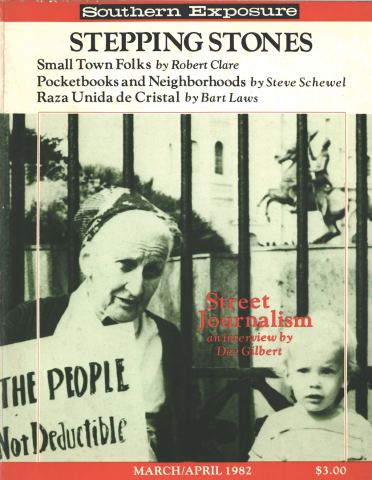Cherokee Removal, A Voice of Protest

This article originally appeared in Southern Exposure Vol. 10 No. 2, "Stepping Stones." Find more from that issue here.
People of the United States are soon to decide a most extraordinary question. It is: Shall our nation violate its faith? The question is no less than this. It cannot be made less. No sophistry can disguise it. No art can conceal it. No party clamors can drown the voice of reason and conscience, which incessantly cries, Beware of National perjury.
The question, then, for our young and boasting Republic to settle is, shall we deliberately make up our minds to forswear ourselves? Shall we calmly, and coolly, and after many months for consideration and reflection, proclaim to the world, in the face of Heaven, that we deem very lightly of our faith; and that we can break treaties by scores and by hundreds, without a pang, and without a blush?
Shall we, the People of the United States, who formed all our constitutions of Government; who do not forget that we govern ourselves; and who expect our will, and not the will of a few privileged men, to be obeyed; shall we perpetrate an act, which combines all the baseness and guilt of the meanest fraud, the most barefaced falsehood, and the most deliberate perjury? Shall we perpetuate such an act, while, in all our intercourse with foreign Nations, we are talking of justice, and honor, and integrity? And are demanding in a high tone of morality, as if conscious of rectitude, that all our rights should be admitted, and all our claims should be regarded as unquestionable? Shall we perpetrate such an act, by encroaching upon the rights of the weak and defenseless, merely because they are weak, and we are strong?
Shall we do this with reference to the descendants of men, who listened to the persuasions and entreaties of our fathers? Who consented to a peace at the earnest solicitation of Washington and other worthies and heroes of the Revolution? Who received from Washington, as Chief Magistrate of the newly formed Union, the very first pledges of the pure and uncontaminated faith of the rising Republic? And who accepted our solemn guaranty, as the great equivalent for large and rich domains, which they relinquished to our expanding population? After expressing, for 40 years, our determination to abide by these very engagements; after repeating and reaffirming these engagements by mouths, and under the seals of all the venerable and honored men whom we had selected as most worthy to hold the highest offices in the State; shall we suddenly have the hardihood, the audacity, the impudence, to absolve ourselves from all the obligations, which rest with such accumulated weight upon us?
Was the man of probity and honor ever transformed, all at once, into a knave, a swindler, a case-hardened villain, taking no pains to hide his villainy? Was it ever heard of, that a chaste matron became, all at once, regardless of common decency? The Romans had a maxim, Nemo repente fit turpissimus. And shall we, in this early age of our growing Nation, after exhibiting to the world most illustrious examples of public virtue, suddenly cast away, as a worn-out Government, all regard to our national character, all respect for the opinions of mankind, all respect for ourselves, all consideration of our permanent interests, and all fear of God, the Avenger of the oppressed?
Is it possible that the People of the United States should hesitate on this question? No; they would not, if they saw that this was the question distinctly proposed to them, that they must answer it; and must be held responsible to the world for the answer. The danger is not, that a majority of the People will decide wrong, with a full understanding of the case; but that apathy will prevail; and the question will be decided the wrong way by interested voices; and thus the character of the country will be lost, before the country will be lost, before the country is aware of it.
The alarm should be sounded by all who can write, and all who can speak; an alarm more earnest and thrilling than would be required to guard against the approach of an invading army, the breaking forth of a pestilence, the conflagration of 50 cities, or the loss of half the property in the nation. If property only were destroyed, after the lapse of a few years the loss would not be known, and posterity would neither see nor feel it. But the loss of character is irreparable. Who would not rather have a son or a brother deprived of his last farthing, with his reputation uninjured, than see him placed in the pillory for manifest fraud and willful perjury, though he might console himself, in his infamy, with the wealth of both the Indies. The ordinary calamities of life are soon past and forgotten; but the deep wound of a ruined character — the ruined character of a nation — after ages are gone, is just beginning to show how disgusting and intolerable the gangrene is.
This piece is excerpted from a seven-part series, originally published in the New York Observer in 1829 as part of a lobbying effort to prevent the passage of laws by Congress that would legitimize the removal. Pressure from the Southern states prevailed and the removal acts were passed, but the words of Jeremiah Evarts attest to the fact that this act of government injustice did not pass without protest. The entire seven-part series, and other writings by Evarts, can be found in a recently published work, Cherokee Removal, edited by Francis Paul Prucha and published by the University of Tennessee Press.
Tags
Jeremiah Evarts
Jeremiah Evarts, writing under the pseudonym William Penn, was the single most influential voice to speak out against the removal of the Cherokee and other Southern Indian nations from their ancestral lands in the 1830s. (1982)